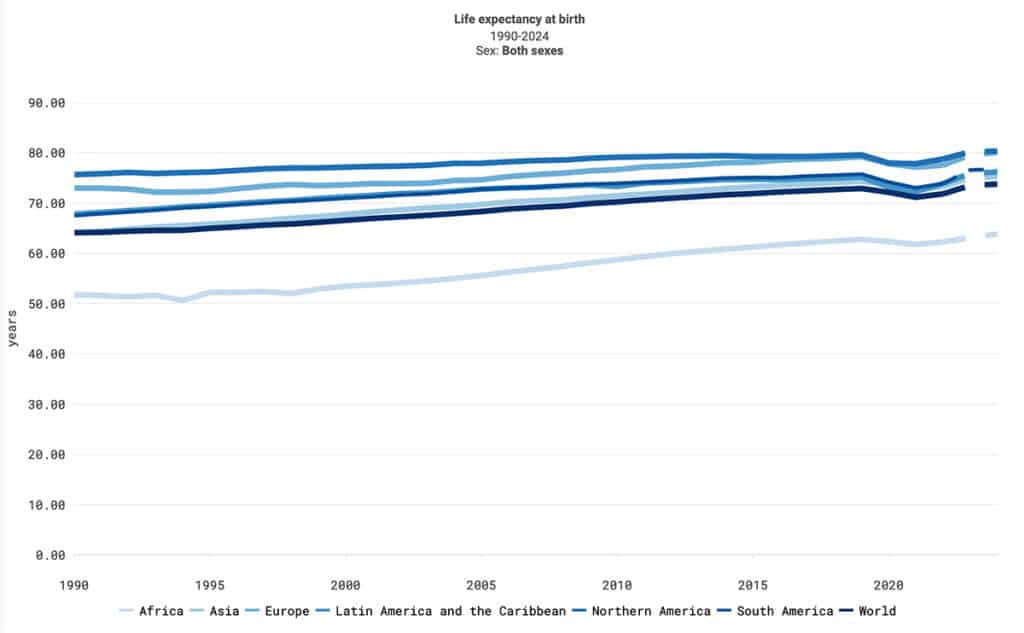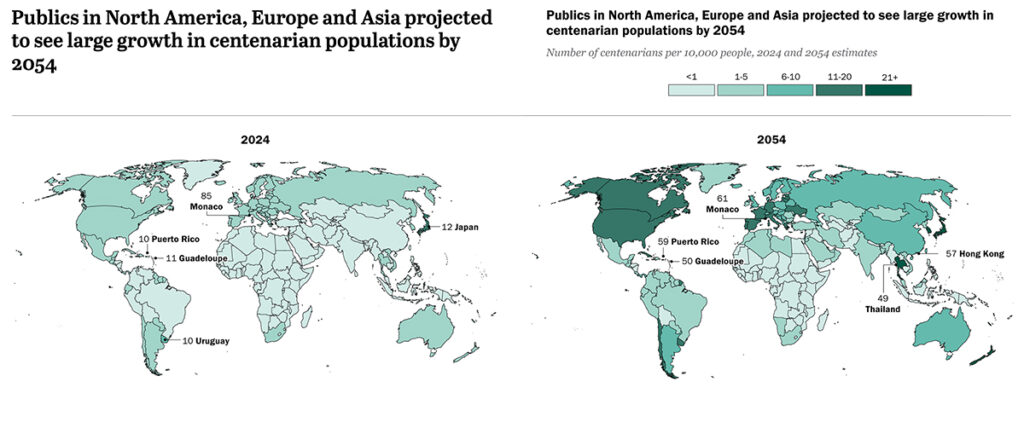Volcanoes are erupting in The Philippines, but on-fire Australia received some welcome rain. The Iran war cries have been called off and The Donald’s military powers are about to be hamstrung by the Senate. Meanwhile, his impeachment trial is starting, and we’re all on Twitter for a front-row seat.
What Could Go Right? The centenarian century
We’re all living longer. So long that the number of the world’s oldest people will quadruple in the next few decades.
This is our weekly newsletter, What Could Go Right? Sign up here to receive it in your inbox every Thursday at 5am ET. You can read past issues here.
Editor’s note: We are unveiling our new newsletter design this week!
What has not changed: You’ll still receive an introduction with one deep dive into a topic of progress, along with a series of news items below it from around the world. And we’ll have our usual list of articles written by members of our network, along with the occasional alert for new books and events.
What has changed: Instead of a long list of links, our new Quick Hits section has summaries of key news items. The idea is to make for easier, faster reading, so you can get the gist without needing to click on anything. As always, however, feel free to click through if you would like more information and context. We will prioritize links to media outlets without a paywall, but when a paywall cannot be avoided, we’ll list the outlet along with a ($).
The Department of Ideas section has been moved to the Quick Hits, under “Editor’s pick.”
We hope this makes the newsletter a better experience for you. But we want to know what you think—do you like the changes, or do you want to go back to “the way it was”? Hit reply to send your thoughts. If you want to do it fast, choose a number between 1 and 5, with 1 being “I hate the changes” and 5 being “all changes fantastic.”
The centenarian century
One progress story that is often taken for granted is the nearly continuous lengthening of life in the past century. All over the world, people are living longer. Life expectancy numbers dipped during the Covid-19 pandemic but have already recovered in every region.

In 2024, median life expectancy at birth in Europe is 80 years old. In North America it’s a little over that. Most people understand this to mean that a baby born today will live to around 80. But as global health researcher Saloni Dattani explained in a recent Substack post, this isn’t the case.
Barring major disruptions, like a pandemic or war, babies born today will likely live longer than the life expectancy number for that year, because it doesn’t capture health advances, improvements in environment, or lifestyle changes that may occur over that baby’s lifetime.
By and large, those yet-to-be-accounted-for factors have been positive for a century. They are often more simple than people expect, as well. The worldwide decline in smoking has driven down rates of cardiovascular diseases and cancers, for instance. And since more men than women smoke and drink, recent decreases in consumption for both have helped lead to the gradual shrinking of the life expectancy gap between genders.

This implicit expectation of betterment is one reason why so many outlets reported on the United States’ “lowest life expectancy since 1996” in 2021, when due to the pandemic life expectancy dropped to 76.4, from a high of 78.8 in 2019. By 2022, per provisional data from the Centers for Disease Control and Prevention (CDC), it had climbed back to 77.5. (Note that the CDC uses average life expectancy, not median as the UN does.) Experts have pointed out that this recovery is slower than in other high-income nations, although it is expected to continue despite headwinds from the opioid crisis.
Still, just like the rest of the world, the US is a much different place than it used to be. Life expectancy in 1900 was a paltry 47. In 1950, it was 68.
Not only are people living longer on average, but more of them are reaching age’s “upper tiers.”
In 1950, there were only 2,300 Americans ages 100 and older in the US. Today, according to new research, there are an estimated 101,000 centenarians, 3 for every 10,000 Americans. The US Census Bureau expects that to quadruple to 422,000 by 2054, or 14 per 10,000.
These centenarians are and will be overwhelmingly white women, although a greater share will be men and minorities as time goes on.
In a few decades there will be many more centenarians around the world as well—4 million by 2054, according to projections, versus the 722,000 today. Most of them will live in the US, Japan, China, India, and Thailand, although their growth is projected virtually everywhere.

This proliferation of centenarians—and really anyone over retirement age—is most often framed as a problem, usually the “how are we going to pay for everyone?” problem. That’s fair to ask. But it’s only one question in a larger set. As The Stanford Center on Longevity points out, societal norms, expectations, and laws based on a world in which people lived to 50 or 60 are going to make increasingly less sense when so many people are living into their 80s, 90s, and 100s.
What does financial security look like? How about second or third careers? Or time spent with grandchildren and even great grandchildren? The Center is focused on creating a “new map for life,” as well as on how to make longevity outcomes more equal across race and class.
What is going to matter, too, is a person’s “healthspan” relative to their lifespan; that is, the number of years in which their health remains good. As much as the former can keep up with the latter—which it has not yet in the US ($)—the answers to some of those questions will be easier to find.
We may land in a world where “50 is the new 30” sooner than we think. That will have its challenges, but also its opportunities. (Start ‘em young with compound interest!) Facing the mix, we should remember that a “centenarian century” is one based on the fundamental success of having lengthened everyone’s time on earth, everywhere.
What Could Go Right? S5 E15

Is there any good left on the Internet? Could we maximize it for generosity instead of conflict? And how do you stay connected in a seemingly ever-polarizing environment? Chris Anderson, author and curator of TED, joins us to discuss the Internet’s potential to create positive change, and why he hasn’t given up on big-money philanthropy. | Listen now
By the Numbers
2023: The safest year in aviation history, with no major fatal accidents involving large commercial aircraft, although there were smaller incidents.
2.93%: Vietnam’s multidimensional poverty rate at the end of 2023. In 2016, it was over 9 percent. (The Economist has more on Vietnam’s possible rise to riches, and what could stop it.)
20%: The increase in solar and wind capacity in ASEAN countries in 2023, moving the bloc closer to its renewable energy target of 35 percent by 2025.
Quick Hits











TPN Member Originals
(Who are our Members? Get to know them.)
- Global politics in 2024: It’s not all doom and gloom | GZERO | Ian Bremmer
- Reasons to be optimistic in 2024—despite everything | FT ($) | Gillian Tett
Albert Wu on Taiwan’s past, present and future | Persuasion | Yascha Mounk
- How the US created the “Iran-backed Houthis” | Nonzero | Robert Wright
- Your questions, answered | Tangle | Isaac Saul
- Biden’s media problem | Slow Boring | Matthew Yglesias
- At Davos, all eyes are on America’s presidential election | WaPo ($) | Fareed Zakaria
- Election countdown, 288 days to go: ‘kissing the ring’ | Breaking the News | James Fallows
- How to spot a frenemy—and be a real friend | The Atlantic ($) | Arthur C. Brooks
- Administrators will be the end of us | NYT ($) | David Brooks
- An Instagram fundraiser helped forgive the medical debt of over 140,000 families | Good Good Good | Sharon McMahon
- Diversity work isn’t working. It’s time to consider a new approach. | The Chronicle of Philanthropy | Eboo Patel
- Pain management tests the limits of drug addiction recovery | NYT ($) | Maia Szalavitz


